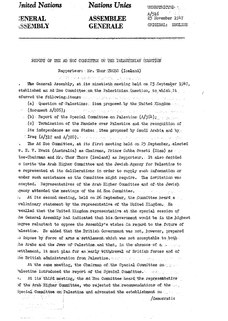 W
WThe Ad Hoc Committee on the Palestinian Question, also known as the Ad Hoc Committee on Palestine or just the Ad Hoc Committee was a committee formed by a vote of the United Nations General Assembly on 23 September 1947, following the publication of the report of the United Nations Special Committee on Palestine (UNSCOP) on 3 September 1947, which contained majority and minority proposals.
 W
WDr. Jorge García Granados was a politician and diplomat from Guatemala, a grandson of Miguel García Granados, the leader and philosopher of the liberal revolution in the 19th century.
 W
WJohn Stanley Grauel was a Methodist minister and American Christian Zionist leader. He was a crew member of the famed refugee ship the SS Exodus-1947 and a secret "Haganah" operative. Grauel is credited with being the key individual who persuaded the United Nations Special Committee on Palestine to recommend for the Partition Resolution of November 1947, creating the State of Israel. In a speech to the Jewish Agency, Golda Meir, referred to his testimony as the first appeal by a “priest, a perfectly worthy gentile, a priori, no Jewish witness was to be believed.”
 W
WThe International Day of Solidarity with the Palestinian People is a UN-organized observance. Events are held at the United Nations headquarters in New York, as well as at the United Nations offices at Geneva, Vienna and Nairobi. It is generally held on November 29 each year to mark the anniversary of resolution 181 which advocated for the partition of Palestine into two States: one Arab and one Jewish. In 2003, it was observed on December 1.
 W
WThe Jarring Mission refers to efforts undertaken by Gunnar Jarring to achieve a peaceful settlement of the conflict between Israel and its Arab neighbors following the Six-Day War in 1967. He was appointed on 23 November 1967 by UN Secretary-General, U Thant, as Special Envoy under the terms of UN Security Council Resolution 242 to negotiate the implementation of the resolution.
 W
WThe following is a list of United Nations resolutions concerning Israel. As of 2013, Israel had been condemned in 45 resolutions by the United Nations Human Rights Council. Since the creation of the Council in 2006, it has resolved almost more resolutions condemning Israel than on the rest of the world combined. The 45 resolutions comprised almost half (45.9%) of all country-specific resolutions passed by the Council, not counting those under Agenda Item 10 . From 1967 to 1989 the UN Security Council adopted 131 resolutions directly addressing the Arab–Israeli conflict. In early Security Council practice, resolutions did not directly invoke Chapter VII. They made an explicit determination of a threat, breach of the peace, or act of aggression, and ordered an action in accordance with Article 39 or 40. Resolution 54 determined that a threat to peace existed within the meaning of Article 39 of the Charter, reiterated the need for a truce, and ordered a cease-fire pursuant to Article 40 of the Charter. Although the phrase "Acting under Chapter VII" was never mentioned as the basis for the action taken, the chapter's authority was being used.
 W
WThe following is a list of United Nations resolutions concerning State of Palestine. From 1967 to 1989 the UN Security Council adopted 131 resolutions directly addressing the Arab–Israeli conflict, with many concerning the Palestinians; Since 2012, a number of resolutions were issued dealing directly with the modern Palestinian State.
 W
WOn July 26, 2002, John Negroponte, the United States Ambassador to the United Nations, stated that the United States will oppose Security Council resolutions concerning the Israeli–Palestinian conflict that condemn Israel without also condemning terrorist groups. This became known as the Negroponte Doctrine, and has been viewed by officials in the United States as a counterweight to the frequent resolutions denouncing Israel that are passed by the UN General Assembly.
 W
WThe Occupied Palestine Resolution is the common name for Document 200 EX/25, passed on October 13, 2016, and formally ratified on October 26, 2016, as a decision of the Executive Board of UNESCO. The resolution is a formal condemnation of Israel, referred to throughout as "the occupying Power", for allowing alleged aggression against the Palestinian people, as well as past failures to protect exclusive Muslim use of the Abrahamic holy site the Temple Mount and infrastructure work in East Jerusalem. The resolution was intended to be put to vote in Turkey in June 2016, but the 2016 Atatürk Airport attack forced UNESCO to postpone the vote until their planned reconvening in Paris during October. The extended period of time allowed the release of the news that such a resolution was to be put into vote, and Israel expressed its outrage. The resolution was put forth by Algeria, Egypt, Lebanon, Morocco, Oman, Qatar and Sudan, and passed 24:6, with 28 abstentions. Ultimately the final count was 23:7. Those voting against included the US, Germany and Britain.
 W
WSir Mohammad Abdur Rahman (1888–1962) was a lawyer and judge from Pakistan born in Delhi, India. He served as a representative of the country of India for the United Nations Special Committee on Palestine (UNSCOP) in the summer of 1947.
 W
WThe United Nations Economic and Social Commission for West Asia is one of five regional commissions under the jurisdiction of the United Nations Economic and Social Council. The role of the Commission is to promote economic and social development of Western Asia through regional and subregional cooperation and integration.
 W
WThe United Nations Fact Finding Mission on the Gaza Conflict, also known as the Goldstone Report, was a team established in April 2009 pursuant to Resolution A/HRC/RES/S-9/1 of the United Nations Human Rights Council (UNHRC) of 12 January 2009, following the Gaza War as an independent international fact-finding mission "to investigate all violations of international human rights law and international humanitarian law by the occupying Power, Israel, against the Palestinian people throughout the Occupied Palestinian Territory, particularly in the occupied Gaza Strip, due to the current aggression". South African jurist Richard Goldstone was appointed to head the mission. The other co-authors of the Report were Hina Jilani, Christine Chinkin and Desmond Travers.
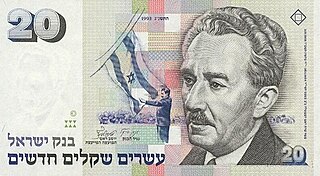 W
WUnited Nations General Assembly Resolution 273 was adopted on May 11, 1949 to admit the State of Israel to membership in the United Nations. It was passed following the approval of UN Security Council Resolution 69 on March 4, 1949.
 W
WUnited Nations General Assembly Resolution 303, adopted on 9 December 1949 by a vote of 38 to 14, restated the United Nations' support for a Corpus separatum in Jerusalem. Notably the voting pattern was significantly different from that of the United Nations Partition Plan for Palestine vote two years earlier, with many states swapping sides. In particular, all the Arab and Muslim countries voted for the corpus separatum, having voted against the 1947 plan; conversely the United States and Israel voted against the corpus separatum, having previously supported it.
 W
WThe United Nations Human Rights Council (UNHRC) is a United Nations body whose mission is to promote and protect human rights around the world. The UNHRC has 47 members elected for staggered three-year terms on a regional group basis. The headquarters of UNHRC is in Geneva, Switzerland.
 W
WThe United Nations Partition Plan for Palestine was a proposal by the United Nations, which recommended a partition of Mandatory Palestine at the end of the British Mandate. On 29 November 1947, the UN General Assembly adopted the Plan as Resolution 181 (II).
 W
WUnited Nations Security Council Resolution 233, adopted on June 6, 1967, after an oral report by the Secretary-General regarding the outbreak of fighting and the situation in the Near East, the Council called upon the governments concerned to take all measures for an immediate cessation of all military activities in the area and requested that the Secretary-General keep the Council promptly and currently informed on the situation.
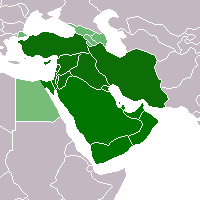 W
WUnited Nations Security Council Resolution 234, was adopted on June 7, 1967, after its appeal to the governments concerned to immediately cease all military activities in the Near East failed. The Council, concerned with the possibility of a broader conflict, demanded that the governments involved discontinue all military activities by 20:00 GMT on June 7, 1967. The Council also requested that the Secretary-General keep them promptly and currently informed on the situation.
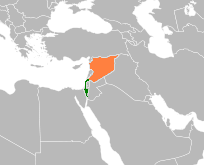 W
WUnited Nations Security Council Resolution 235, adopted on June 9, 1967, after noting that the governments of both Israel and Syria have accepted the Council's demand for a cease-fire, the Council demanded that hostilities should cease forthwith and requested that the Secretary-General make immediate contacts with the Governments of Israel and Syria to immediately arrange compliance with the cease-fire and to report to the Security Council within 2 hours of the resolution.
 W
WUnited Nations Security Council resolution 446, adopted on 22 March 1979, concerned the issue of Israeli settlements in the "Arab territories occupied by Israel since 1967, including Jerusalem". This refers to the Palestinian territories of the West Bank, East Jerusalem and the Gaza Strip as well as the Syrian Golan Heights.
 W
WUnited Nations Security Council Resolution 452, adopted 20 July 1979, was on the issue of the Israeli settlements in Jerusalem, the West Bank, Gaza Strip and the Golan Heights, specifically the illegality thereof. It states "the policy of Israel in establishing settlements in the occupied Arab territories has no legal validity and constitutes a violation of the Fourth Geneva Convention relative to the Protection of Civilian Persons in Time of War of 12 August 1949" and "calls upon the Government and people of Israel to cease, on an urgent basis, the establishment, construction and planning of settlements in the Arab territories occupied since 1967, including Jerusalem."
 W
WUnited Nations Security Council resolution 465, adopted unanimously on 1 March 1980, was on the issue of the Israeli settlements and administration in "the Arab territories occupied since 1967, including Jerusalem", referring to the Palestinian territories of the West Bank including East Jerusalem and the Gaza Strip as well as the Syrian Golan Heights.
 W
WUnited Nations Security Council resolution 468, adopted on 8 May 1980, after recalling the Geneva Conventions, the Council expressed its concern regarding the expulsion of the Mayors of Hebron and Halhoul, as well as the Sharia judge of Hebron by occupying Israeli forces.
 W
WUnited Nations Security Council resolution 469, adopted on 20 May 1980, after considering a report by the Secretary-General and noting relevant parts of the Geneva Convention, the Council deplored the Government of Israel's failure to implement Resolution 468 (1980).
 W
WUnited Nations Security Council Resolution 471, adopted on 5 June 1980 under Chapter VI of the United Nations Charter was on the issue of the Israeli occupation and settlement activity in the Palestinian territories of East Jerusalem, the West Bank, Gaza Strip and the Golan Heights.
 W
WUnited Nations Security Council resolution 476, adopted on 30 June 1980, declared that "all legislative and administrative measures and actions taken by Israel, the occupying Power, which purport to alter the character and status of the Holy City of Jerusalem have no legal validity and constitute a flagrant violation of the Fourth Geneva Convention".
 W
WUnited Nations Security Council Resolution 478, adopted on 20 August 1980, is one of seven UNSC resolutions condemning Israel's attempted annexation of East Jerusalem. In particular, UNSC res 478 notes Israel's non-compliance with United Nations Security Council Resolution 476 and condemned Israel's 1980 Jerusalem Law which declared Jerusalem to be Israel's "complete and united" capital, as a violation of international law. The resolution states that the Council will not recognize this law, and calls on member states to accept the decision of the council. This resolution also calls upon member states to withdraw their diplomatic missions from the city.
 W
WUnited Nations Security Council resolution 484, adopted unanimously on 19 December 1980, after recalling resolutions 468 (1980) and 469 (1980) on the topic, the Council expressed its concern regarding the expulsion of the Mayors of Hebron and Halhoul, as well as the Sharia judge of Hebron by occupying Israeli forces.
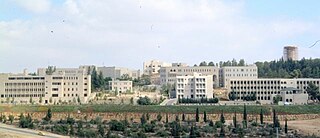 W
WUnited Nations Security Council resolution 592, adopted on 8 December 1986, having considered a letter from the representative of Zimbabwe in his capacity as Chairman of the Movement of Non-Aligned Countries, the Council reaffirmed the Geneva Conventions and condemned the opening of fire at a student demonstration by the Israel Defense Forces, in which two students were killed at Birzeit University.
 W
WUnited Nations Security Council resolution 605, adopted on 22 December 1987, after hearing from a representative from South Yemen and recalling the Geneva Conventions and Security Council resolutions 446 (1979), 465 (1980), 497 (1981) and 592 (1986), the Council condemned Israel for violating the human rights of the Palestinian people and in particular the opening of fire and killing of students in the first few weeks of the First Intifada.
 W
WUnited Nations Security Council resolution 607, adopted unanimously on 5 January 1988, after recalling Resolution 605 (1987) and being informed of the decision of Israel to continue deportations of Palestinians in the occupied territories, the Council reaffirmed the applicability of the Fourth Geneva Convention referring to the protection of civilians in times of war.
 W
WUnited Nations Security Council Resolution 608, adopted on 14 January 1988, after recalling Resolution 607 (1988), the Council expressed regret at Israel's decision to deport Palestinians in the occupied territories in defiance of the previous resolution on the topic.
 W
WUnited Nations Security Council resolution 636, adopted on 6 July 1989, after reaffirming resolutions 608 (1988) and 609 (1988) and learning of the deportation of eight Palestinians by Israel in the occupied territories on 29 June 1989, the Council condemned the continued deportations and reaffirmed the applicability of the Fourth Geneva Convention referring to the protection of civilians in times of war.
 W
WUnited Nations Security Council resolution 636, adopted on 30 August 1989, after reaffirming resolutions 608 (1988), 636 (1989) and learning of the deportation of five Palestinians by Israel in the occupied territories on 27 August 1989, the Council condemned the continued deportations and reaffirmed the applicability of the Fourth Geneva Convention referring to the protection of civilians in times of war.
 W
WUnited Nations Security Council resolution 672, adopted unanimously on 12 October 1990, after reaffirming resolutions 476 (1980), 478 (1980), the Council expressed alarm at the 1990 Temple Mount riots in Jerusalem on 8 October 1990, resulting in the death of over 20 Palestinians and the injury of more than 150 people, including Palestinian civilians and worshippers.
 W
WUnited Nations Security Council resolution 673, adopted unanimously on 24 October 1990, after reaffirming Resolution 672 (1990), the Council deplored Israel's refusal to receive the mission of the Secretary-General to the region.
 W
WUnited Nations Security Council resolution 681, adopted unanimously on 20 December 1990, after receiving the report from the Secretary-General Javier Pérez de Cuéllar authorised in Resolution 672 (1990) regarding the riots at Temple Mount, the Council expressed its concern over Israel's rejection of resolutions 672 (1990) and 673 (1990).
 W
WUnited Nations Security Council resolution 694, adopted unanimously on 24 May 1991, after reaffirming Resolution 681 (1990) and learning of the deportation of four Palestinians by Israel in the occupied territories on 18 May 1991, the Council condemned the deportations that were in violation of the Fourth Geneva Convention referring to the protection of civilians in times of war.
 W
WUnited Nations Security Council resolution 726, adopted unanimously on 6 January 1992, after reaffirming 607 (1988), 608 (1988), 636 (1989), 641 (1989) and 694 (1991) and learning of the deportation of twelve Palestinians by Israel in the occupied territories, the Council condemned the deportations that were in violation of the Fourth Geneva Convention referring to the protection of civilians in times of war.
 W
WUnited Nations Security Council resolution 799, adopted unanimously on 18 December 1992, after reaffirming resolutions 607 (1988), 608 (1990), 636 (1989), 641 (1989), 681 (1990), 694 (1991) and 726 (1992) and learning of the deportation of hundreds of Palestinians by Israel in the occupied territories on 17 December 1992, the Council condemned the deportations that were in violation of the Fourth Geneva Convention referring to the protection of civilians in times of war.
 W
WUnited Nations Security Council resolution 904 was adopted without a vote on 18 March 1994. After expressing its shock at the massacre committed against Palestinian worshippers in the Cave of the Patriarchs in Hebron in the West Bank, the Council called for measures to be taken to guarantee the safety and protection of the Palestinian civilians throughout the occupied territory.
 W
WUnited Nations Security Council resolution 1073, adopted on 28 September 1996, after recalling all resolutions on Jerusalem and noting a letter from Saudi Arabia on behalf of the Arab League, the Council called on Israel to cease and reverse all acts which had resulted in aggravation in the region.
 W
WIn United Nations Security Council resolution 1322, adopted on 7 October 2000, after recalling resolutions 476 (1980), 478 (1980), 672 (1990) and 1073 (1996), the Council deplored the visit by Ariel Sharon to the Temple Mount and the subsequent violence which, according to the Resolution, had resulted in the deaths of over 80 Palestinians. The Resolution did not condemn or mention reported Israeli deaths, although it did deplore what it described as "many other casualties."
 W
WUnited Nations Security Council resolution 1397 was a resolution adopted on 12 March 2002 by the United Nations Security Council. The Council demanded an end to the violence that had taken place between the Israeli and Palestinian sides since September 2000. It was the first Security Council resolution to call for a two-state solution to the conflict.
 W
WUnited Nations Security Council resolution 1402, adopted on 30 March 2002, after recalling resolutions 242 (1967), 338 (1973), 1397 (2002) and the Madrid principles, the Council called for an immediate and meaningful ceasefire between the Israeli and Palestinian during Operation Defensive Shield. It was adopted after 12 hours of consultations.
 W
WUnited Nations Security Council resolution 1403, adopted unanimously on 4 April 2002, after recalling resolutions 1397 (2002) and 1402 (2002), the Council demanded the implementation of Resolution 1402 by the Israeli and Palestinian sides.
 W
WUnited Nations Security Council resolution 1405, adopted unanimously on 19 April 2002, after recalling resolutions 242 (1967), 338 (1973), 1397 (2002), 1402 (2002) and 1403 (2002), the Council emphasised the necessity of humanitarian access to the Palestinian population.
 W
WUnited Nations Security Council resolution 1435, adopted on 24 September 2002, after recalling resolutions 242 (1967), 338 (1973), 1397 (2002), 1402 (2002) and 1403 (2002), the Council demanded the end to Israeli measures in Ramallah, including the destruction of Palestinian infrastructure.
 W
WUnited Nations Security Council resolution 1515, adopted unanimously on 19 November 2003, after recalling all previous resolutions on the situation in the Middle East, particularly resolutions 242 (1967), 338 (1973), 1397 (2002) and the Madrid Principles, the Council endorsed the Road map for peace proposed by the Middle East Quartet in an attempt to resolve the Israeli–Palestinian conflict. The resolution, proposed by Russia, envisaged a Palestinian state by 2005 in return for security guarantees for Israel.
 W
WUnited Nations Security Council resolution 1544, adopted on 19 May 2004, after recalling resolutions 242 (1967), 338 (1973), 446 (1979), 1322 (2000), 1397 (2002), 1402 (2002), 1403 (2002), 1405 (2002), 1435 (2002) and 1515 (2003), the Council called on Israel to cease demolishing Palestinian homes.
 W
WThe United Nations Special Committee on Palestine (UNSCOP) was created on 15 May 1947 in response to a United Kingdom government request that the General Assembly "make recommendations under article 10 of the Charter, concerning the future government of Palestine". The British government had also recommended the establishment of a special committee to prepare a report for the General Assembly. The General Assembly adopted the recommendation to set up the UNSCOP to investigate the cause of the conflict in Palestine, and, if possible, devise a solution. UNSCOP was made up of representatives of 11 countries. UNSCOP visited Palestine and gathered testimony from Zionist organisations in Palestine and in the US. The Arab Higher Committee boycotted the Commission, explaining that the Palestinian Arabs' natural rights were self-evident and could not continue to be subject to investigation, but rather deserved to be recognized on the basis of the principles of the United Nations Charter.
 W
WThe United Nations Truce Supervision Organization (UNTSO) is an organization founded on 29 May 1948 for peacekeeping in the Middle East. Its primary task was providing the military command structure to the peacekeeping forces in the Middle East to enable the peacekeepers to observe and maintain the ceasefire, and as may be necessary in assisting the parties to the Armistice Agreements in the supervision of the application and observance of the terms of those Agreements. The command structure of the UNTSO was maintained to cover the later peacekeeping organisations of the United Nations Disengagement Observer Force (UNDOF) and the United Nations Interim Force in Lebanon (UNIFIL).
 W
WOn December 6, 2017, US President Donald Trump announced the United States recognition of Jerusalem as the capital of Israel and ordered the planning of the relocation of the U.S. Embassy in Israel from Tel Aviv to Jerusalem. Benjamin Netanyahu, the Prime Minister of Israel, welcomed the decision and praised the announcement. On December 8, Secretary of State Rex Tillerson clarified that the President's statement "did not indicate any final status for Jerusalem" and "was very clear that the final status, including the borders, would be left to the two parties to negotiate and decide."